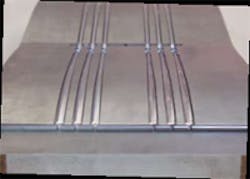PKT Prazisionskunststofftechnik Burtlmair Gesellschaft MbH near Linz, Austria, specializes in producing plastic molded products, one of which is the company’s Switch-It system. The system lets eyeglass wearers change the look of their glasses without having to order new lenses.
The molds for these types of plastic components for glasses previously were made in an extremely time-consuming way. Additionally, the precision requirements of the mold are critical, and if not met, the resulting plastic pieces will not snap into place correctly.
The process involved milling the mold on a machining center, creating electrodes for an EDM process, running the EDM process and hand polishing to finish the job.
PKT wanted to manufacture the precise mold for the eyeglass components with fewer operations, so it switched from milling and fine EDMing to hard milling with a Pyramid Nano machining center from Kern.
According to Hermann Burtlmair, PKT managing partner, going to hardmilling on the Kern machine has saved a substantial amount of time and improved surface finish quality so that manual polishing is nearly eliminated.
The machine achieves accuracies of +/- 1.0 micron, has hydrostatic guides that work at exactly 300 Nm (positioning scatter), and uses Heidenhain type iTNC 530 smarT.NC controls.
PKT’s Pyramid Nano came with a 36,000-rpm spindle and in a version that can travel to 400 mm in the Z axis. The X and Y axes each have a 500-mm travel.
Burtlmair’s son Michael works with the Pyramid Nano and said that little mold polishing is necessary with hardmilling.
“Polishing one mold cavity previously took up to three hours. Now it takes about ten minutes,” he said. In addition, the mold for the eyeglass temples has been expanded to a 12-cavity tool from a double cavity tool, so the time required to produce the mold could have increased nearly a week. In addition, polishing a 12-cavity tool runs the risk of rounding off sharp details.
Hardmilling also saves PKT tooling costs. The shop uses two milling cutters for a 12-cavity tool. Previously, it required six to eight cutters and three or four electrodes to produce the mold with fewer cavities.
Mold inserts for the eyeglass components are high strength steel with hardnesses of about 54 HRC. The eyeglass components are made of polyamide 12 plastic resin. Because of electrolytic melting, the steel used for the 12-cavity molds has a higher purity and good polishing properties. PKT finish cuts the material with coated tools and CBN milling tools from Mitsubishi and Karnasch that it cools with oil mist or compressed air.
PKT also measures tools in its machines with a Blum laser tool measurement system that helps to further improve part surface finishes. Burtlmair said that measuring tools with the laser results in surface finishes without unevenness or edge transition lines.
Contributing to the Pyramid Nano’s precision is the fact that Kern, like many other machine builders, incorporates inventive cooling management and the controlling of external heat sources outside the machine. The company also controls vibrations that can negatively affect a machine’s precision. Vibrations from machining or from external sources are absorbed by the machine’s bed, which is made of a new material called Kern Armorith
